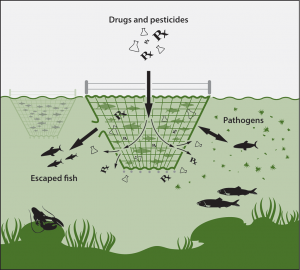16
May
Pesticides Contaminate Fish Farms, Fish Farm Fined
 (Beyond Pesticides, May 16, 2018) Northern Harvest Sea Farms, an ocean-based fish farm in New Brunswick, Canada, was appeared in court yesterday to answer legal charges stemming from the off-label use of an unnamed pesticide added to its operations to combat severe sea lice outbreaks. The company holds nine licenses for farmed Atlantic salmon cages on the Bay of Fundy, as well as for fish farms off the Newfoundland coast. Sea lice outbreaks are a common at over-crowded, ocean-based fish farms because such facilities afford the optimum conditions for rapidly reproducing and spreading lice. In response, some companies have turned to using illegal and off-label pesticide applications to stave off the problem, which causes huge farmed salmon kills.
(Beyond Pesticides, May 16, 2018) Northern Harvest Sea Farms, an ocean-based fish farm in New Brunswick, Canada, was appeared in court yesterday to answer legal charges stemming from the off-label use of an unnamed pesticide added to its operations to combat severe sea lice outbreaks. The company holds nine licenses for farmed Atlantic salmon cages on the Bay of Fundy, as well as for fish farms off the Newfoundland coast. Sea lice outbreaks are a common at over-crowded, ocean-based fish farms because such facilities afford the optimum conditions for rapidly reproducing and spreading lice. In response, some companies have turned to using illegal and off-label pesticide applications to stave off the problem, which causes huge farmed salmon kills.
The company was issued a $12,000 fine that was challenged as inadequate by the Grand Manan Fishermen’s Association. Bonnie Morse, project manager for the association told Canadian Broadcasting Corporation (CBC) news, “I think any time there’s a fine that’s a deterrent to illegal activity, it should be an actual deterrent to the activity,” said Morse. “When you’re looking at $1.5 million worth of fish, their actions speak for themselves.” Maria Recchia, the executive director of the Fundy North Fishermen’s Association, questioned the allowance of fish farming in the ocean,telling the CBC that the province should not have permitted fish farming in Head Harbour.
Fish farming or aquaculture in the open ocean, refers to the breeding, rearing, and harvesting of aquatic organisms, such as fish, shellfish, and plants. In the open ocean, millions of salmon are reared in confined fish farms and fed processed feed, antibiotics, and parasiticides to keep them alive and disease-free. Ocean water flows in and out of these in permeable nets and pens, which often suffer breaches and fish escapes due to harsh climate conditions and predators.

Salmon net-pen aquaculture interacts with the environment
Fish lice are pervasive and lethal in fish farms. In 2017, over a quarter million salmon died from lice infestations at two Gray Group salmon farms in the Bay of Fundy in New Brunswick, Canada. The company preemptively killed another 284,000 salmon in an effort to contain the outbreak and further limit the damage. In Northwest Scotland, lice infestations are a huge problem in their fish farms as well and a leading threat to marine ecosystems where the country’s fish farms are located. In response, the wild fish and water conservation organization, Salmon & Trout Conservation Scotland (S&TC Scotland) and 27 environmental non-governmental organizations (NGOs) and others, are calling on Parliament to institute “an immediate moratorium on any new open cage marine salmon farms in Scotland.”
Lice attach to the skin of salmon, causing wounds by feeding on fish mucus, skin, muscle and blood. They weaken fish and expose them to infection and disease. Mortality occurs in young fish (smolts) due to damaged fins, skin lesions, stress, salt imbalances, altered swimming performance, and reduced resistance. Fish escapes are a common. As recently as February, over 21,000 fish escaped from a Norwegian-owned fish farm near the Island of Skye. Escaped farmed fish can infect wild salmon populations with lice and other diseases as they come into contact with smolts swimming out to sea and adults returning to their birth river to spawn.
At fish farms around the world, lice problems are worsening and the lice are developing resistance to the medicines and chemicals designed to curtail their spread. Routine treatments with pesticides, such as emamectin benzoate and cypermethrin, which is illegal in Canada, are used to minimize the impacts to farmed fish living in the unhealthy marine environment. Unfortunately, elevated pesticide use has had the opposite effect, contributing to accelerated pest resistance and prompting fish farms operators to employ increasingly higher doses at fish farms in Canada and elsewhere.
Environment Canada has found traces of cypermethrin in lobster traps and storage sites a mile from Pleasant Point, Maine. The New Brunswick-based Cooke Aquaculture, which operates 100 fish farms on Canada’s Atlantic coast, pled guilty and was fined for illegally using the cypermethrin implicated in hundreds of lobster deaths. Kelly Cove Salmon, a Cooke Aquaculture subsidiary, was also fined a half million dollars for illegally using cypermethrin in violation of Canada’s Fisheries Act. A 2018 Report to the Canadian Parliament by the Commissioner of the Environment and Sustainable Development examined the impacts of the country’s fish farms and concluded that little progress had been made in improving the situation. “Overall, we found that Fisheries and Oceans Canada had not made sufficient progress in completing risk assessments for key diseases, which were required to assess the effects of salmon farming on wild fish.” Matthew Abbott, New Brunswick’s Fundy Baykeeper and Marine Conservation Director, further warns that the use of pesticides in the bay is a big concern even when they are used legally.
The U.S. Department of Agriculture’s National Organic Program has been considering allowing salmon from ocean-based fish farms to be certified organic, against a strong tide of public opposition. Still, no regulations have been adopted to allow organic certification of farmed fish. In the EU and Canada, where governments certify organic fish, the environmental impacts remain remarkably similar to conventionally farmed salmon because the operations exist in the same marine environment, using similar management practices. The EU’s organic fish farms use some organic ingredients in their feed rations, like organic wheat and organic soy, which conventional farms do not use. But, neither ingredient is part of a salmon’s natural diet. The UK’s Organic Soil Association’s organic regulations require stocking densities of 30,000 fish per cage versus 70,000 for conventional fish farms. Either way, the salmon still grow in crowded cages where their natural migration behavior is completely eliminated.
It is important for consumers to know that all “Atlantic Salmon” sold in the U.S. is farmed. That is why it often has a slight gray tinge, it is oilier and less firm than normal, and it lacks the rich savory taste of wild salmon. Organic salmon certified in accordance EU regulations costs the same as wild salmon but affords little if any discernible environmental benefits, only costs. On the contrary, organic fish farming significantly contributes to marine pollution by adding synthetic pesticides and antibiotics to the marine environment, which contravenes consumer expectations of organic food production systems.
Given the enormous environmental burden fish farms pose to the marine environment – organic and conventional – and their deleterious effects on wild fish populations, certified organic salmon should never be considered an option in the US. To support the integrity of organic and to oppose allowing fish reared in ocean-based fish farms to be certified organic, go to Beyond Pesticides’ Keeping Organic Strong webpage.
All unattributed positions and opinions in this piece are those of Beyond Pesticides.
Sources: CBC; Bangor Daily News; Organic Advocacy; CBC News










